

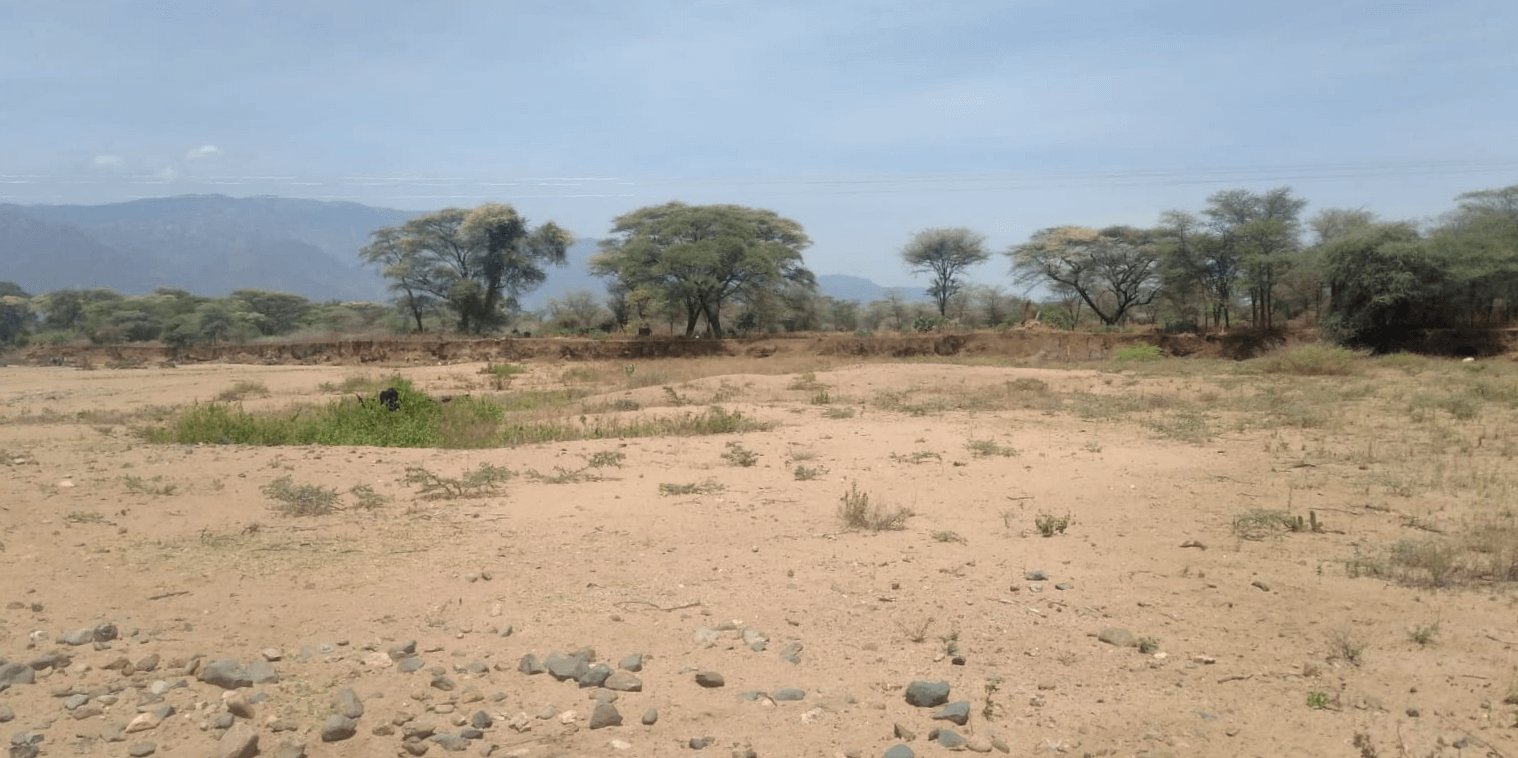
We work in a semi-arid area directly on the equator where most people are small-scale farmers – producing just enough to feed their families and pay for necessities.
Drought is a huge problem and both the crops and farming methods being used are not suited to the harsh conditions. Climates in Kenya vary wildly over small areas, so it is difficult for individual farmers to find what is right for their area; what works on one farm could completely fail on a farm 30km away. Rain patterns have also become much more erratic in recent years.
Local farmers with limited resources are not in a position to experiment with unproven crops or farming techniques and so they persist with traditional methods, even when they are unreliable (50% failure rates). As a result, farmers and their families really struggle and regularly experience both hunger and economic difficulty - perpetuating the cycle of poverty.

Solving such a deep-rooted and difficult problem is crucial to help lift this community out of poverty. This is a difficult task, which will take time and perseverance. As a result farming has always been and will remain a major focus area for us.
On our demonstration farms in Sarambei (14 acres) and Rongai (5 acres) we experiment with new crops and farming methods to determine which are best suited to this particular climate. On-farm trials show both successes and failures. We then give training & assistance to help local farmers implement beneficial techniques.
We facilitate discussion groups where farmers come together to share and learn from their experiences and we are also working towards creating a farmer’s co-op where shared services and supports can be accessed.
How do we decide what to do? We do extensive research before beginning a new program, consulting with The Local Community to find out where they need the most help, as well as Farming Experts in Ireland & Kenya to ensure that we showcase the best solutions with the maximum chance of success.
What farming supports do we provide? We provide regular training sessions for local farmers on all the farming methods being used on our farm, as well as ongoing support throughout the year.
What financial supports do we provide? We facilitate table banking groups and micro-finance loans which farmers can used to fund innovations where setup costs are high (read more here). All participants on our farming programs are required to be a member of a table banking group.
The following sections outline the programs we are currently running.
Dairy farming in the areas we work is not very productive, with each cow producing less than 1 litre per day. The main reasons for this are
We implement the following techniques on our farm in order to investigate and showcase how to best improve milk production.
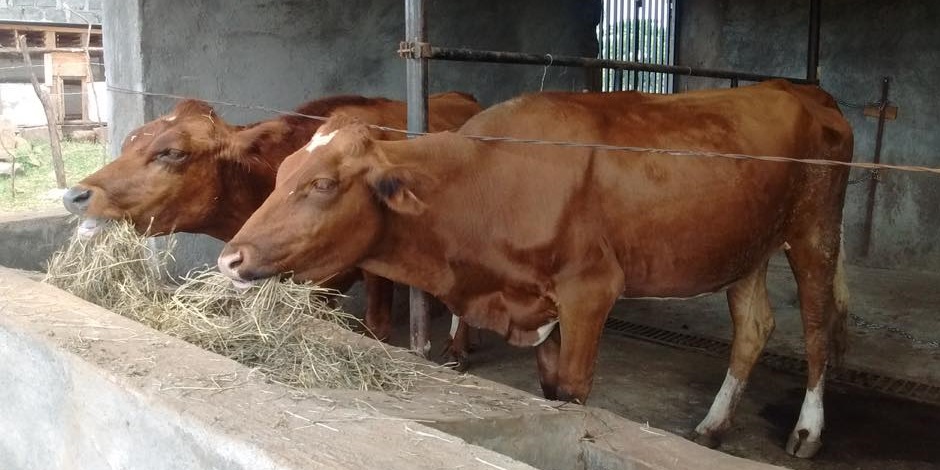
Zero Grazing is a feeding technique whereby cows are kept in a shed and are brought cultivated fodder and harvested rainwater. Milk yields can be greatly improved with this combination of better quality food, clean water, energy conservation (no foraging) and minimal disease risk.
On our farm we have adult cows and calves. In terms of facilities we have cow barns, hay barns, slurry storage, a milking area, a milk cooling/storage facility and a general store.
Fodder for the cows is produced on our farm and rainwater is harvested in ponds.
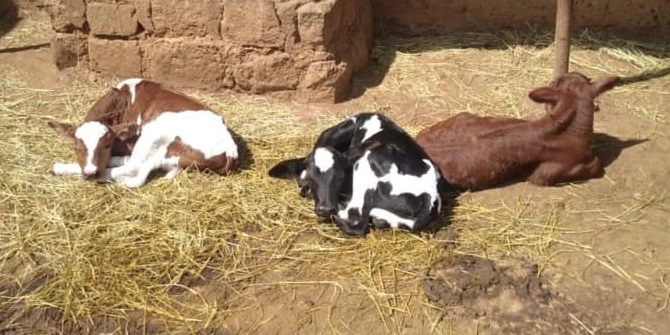
Cross-bred cows (e.g. Sahiwal/Ayreshire, Sahiwal/Friesian, Sahiwal/Jersey) combine the hardiness of local breeds with the higher yields associated with breeds like Friesian and Ayreshire.
On our farm we have cows of various different cross-breeds and we continue to investigate different breed mixes to determine the most suitable ones.
We show farmers our records of food intake versus milk production, as well as the cost breakdown & expected returns associated with each breed.

All feed for the cows must be grown / produced onsite; though common elsewhere, supplementing grass/silage/hay with a lot of nutrient-rich concentrates (e.g. grains) to meet protien requirements is not sustainable in Kenya because of cost, availability and quality issues.
On our farm we grow various grass types (e.g. lucerne, desmodium, sorghum) to determine their hardiness, nutritiousness & how they affect milk yields in cows of different breeds. We also provide farmers with napier grass nodes & sweet potato vines to supplement the forage crops.
Over the years we have determined the most reliable sources of seed, which we can purchase collectively for distribution amongst our farmers.
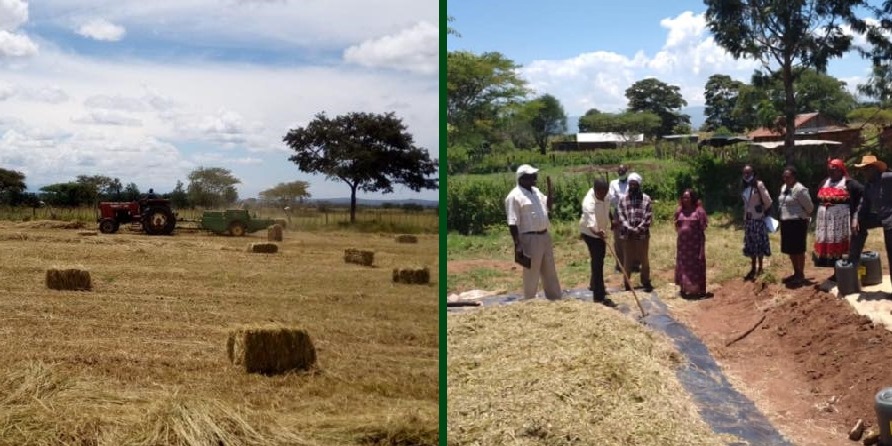
The traditional approach to leaving cows forage for food and water means that the dry season is extremely problematic for dairy farmers, with milk yields almost non-existent. Preserving food for cows is thus vital to ensure stability in milk production.
Silage: Our farm is the first in the area to have produced silage. With our help, a number of local farmers are not only producing their own silage, but they are helping to train even more farmers.
Hay: More & more local farmers are seeing hay as an accessible solution, especially with the option to use our hay storage facility to ensure they have a year-round supply of fodder for their cattle.
Farmers that participate in our banking & farming programs can avail of our farm machinery at a subsidised price (cost price for everyone else) to help with the production of hay & silage.
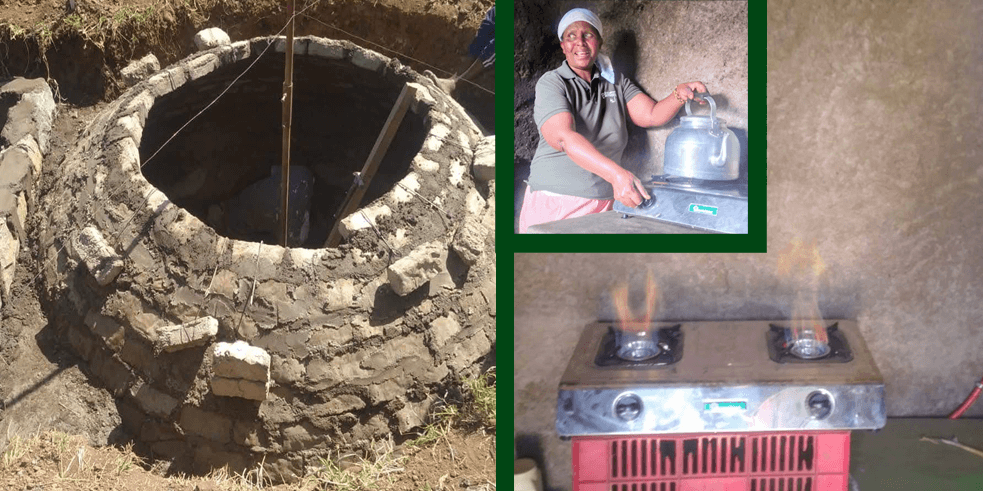
A biodigester is a device which allows cow manure to be used to produce gas for cooking. A large underground pit stores the dung and the gas that is emitted is piped to a hob.
While installation is expensive, biodigesters have huge benefits over the traditional wood fires that are used for cooking in the area:
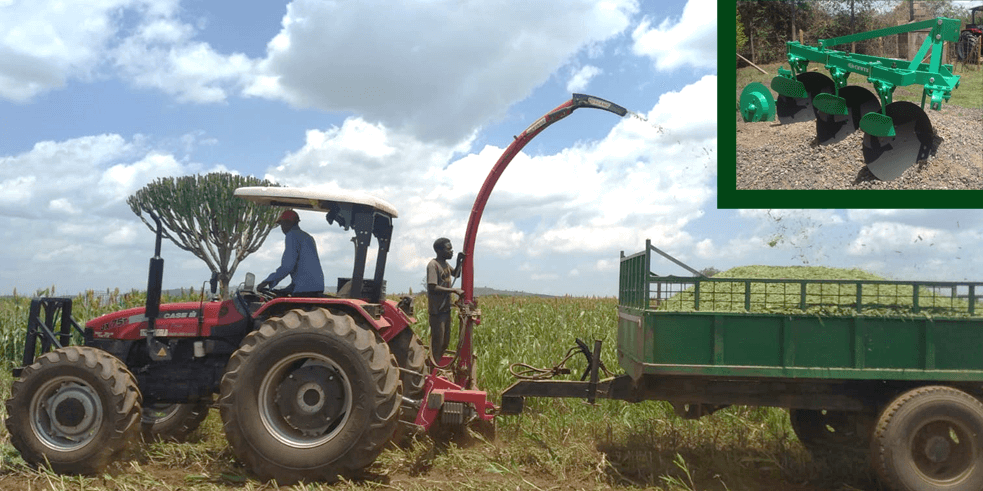
The long dry season is crippling for dairy farmers, but cutting and saving fodder for cows is so labour intensive that it is simply not feasible. Large farm machinery is prohibitively expensive and beyond the reach of most farmers in Kenya; this greatly limits farming potential.
On our farm we have a Tractor, Silage Harvester and Plough. As well as using them on our demonstration farm to train local farmers in making fodder, they are also available for use by the general community.
Such technological advances are greatly enhancing the capability of farmers in our area and thus helping to improve the community as a whole.
Our tractor is in such demand that we have had to prioritise its use. In 2022 the tractor & plough were use by 70 farmers and the silage harvester was used by 22 farmers.

With milk yields improving, farmers need somewhere to sell their excess milk. A number of neighbouring farmers bring their milk to our farm every morning so that it can be transported and sold - alongside the milk produced on our farm - to nearby retailers (hotels, tea stations, etc). This allows the farmers to bypass expensive middle-men and thus maximise their profits.
We hope to eventually form a farmers co-operative where milk would be collected daily from individual farms, processed and sold at a community shop/kiosk, along with other farm produce.
The production of value-added dairy products such as yoghurt and cheese would also be beneficial and could be done on a cooperative basis.
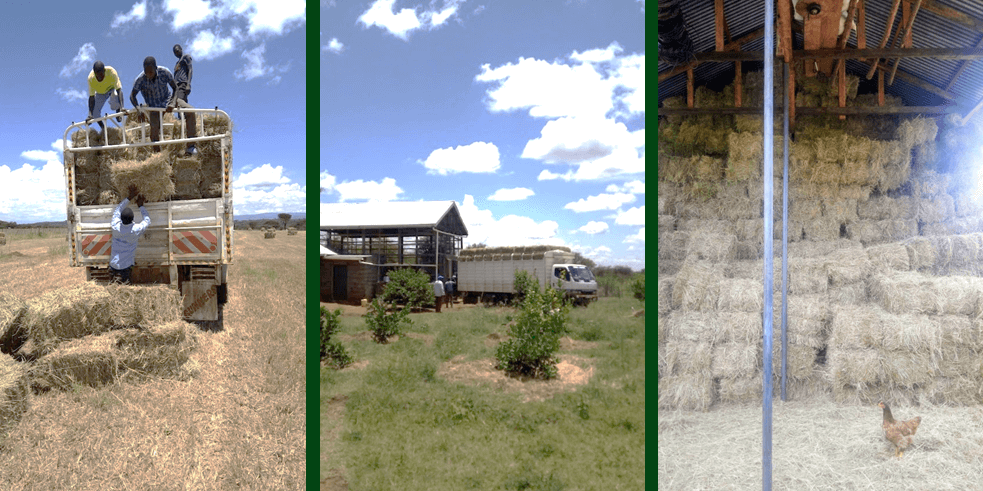
Hay production is not a new practise in the areas we work, but with minimal storage options available, most farmers have to sell at a low price when the market is saturated. During the dry season they then have to pay up to 3x the price to buy bales to feed their cattle.
On our farm we have 2 hay barns* (total capacity of 10,000 bales) which are available for use by participants in our farming & table banking programs.
Providing farmers with a storage facility has a hugely positive impact on their financial stability, since they
We are now involved in a major collaboratative dairy program with development partners; this has been the driving force behind many of our recent dairy initiatives. Read more below.
Maize and beans are the most common crops grown all over Kenya and in the areas where we work, but they don't grow well in this drought-prone area and regularly fail.
In order for farmers to make the most of their limited resources, it is essential that they diversify their crops and use better farming techniques that are more suitable for the conditions.
We use the following methods on our farm in order to demonstrate how crop yields can be improved.
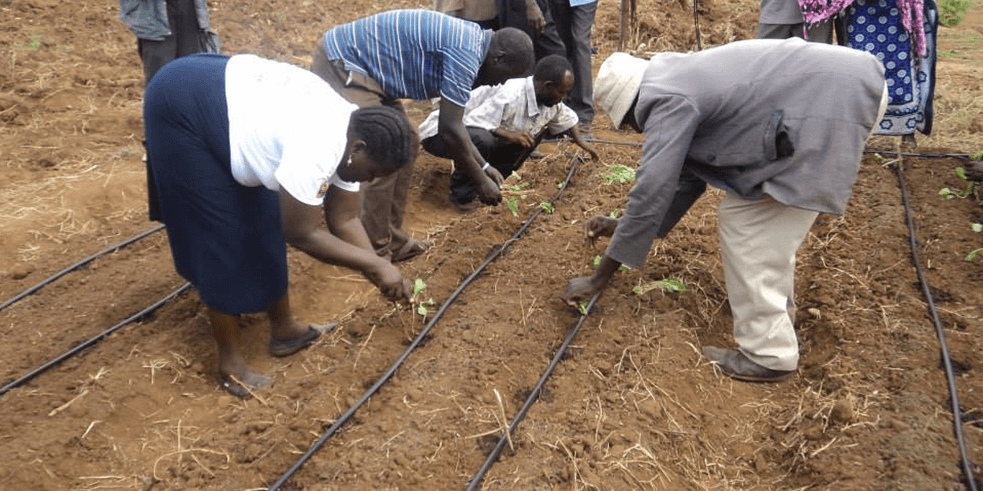
The main reason for crop failure in this semi-arid climate is lack of rain, so irrigation is the only solution to this problem.
In drip irrigation we deliver water directly to the roots of crops to ensure that the plants have the water they need while minimising wastage of this precious resource.
Access to clean water is obviously an essential component of such a farming method so a suitable water harvesting solution is also used (see more).
Low-cost drip irrigation kits are made available at our regular training sessions.

Using greenhouses in a hot, dry climate may seem strange, but greenhouses provide many more advantages than just heat.
The use of greenhouses thus helps farmers to minimise costs & maximise profits.
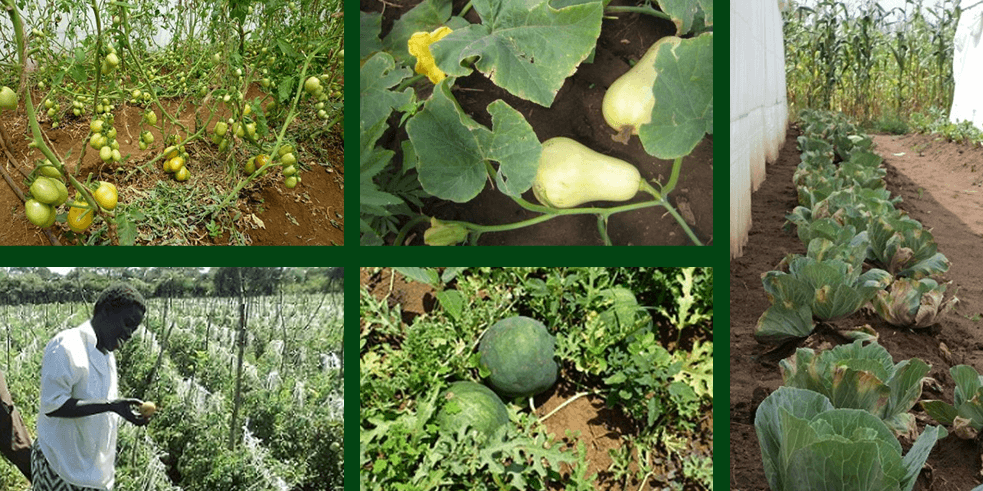
Maize and beans are the most common crops in Kenya, but they don't grow well in this drought-prone area and regularly fail. In order for farmers to make the most of their limited resources, they must diversify and start growing crops that are more suitable for the conditions.
Introducing drought-resistent crops (e.g. sweet potatoes, cassava, sorghum) offer more stable yields and provide extra nutrients to families, while cash crops (e.g. watermelon, mango, bananas) can provide families with additional income.
On our demonstration farm we trial various types of crops so that we can advise local farmers on the most suitable ones.
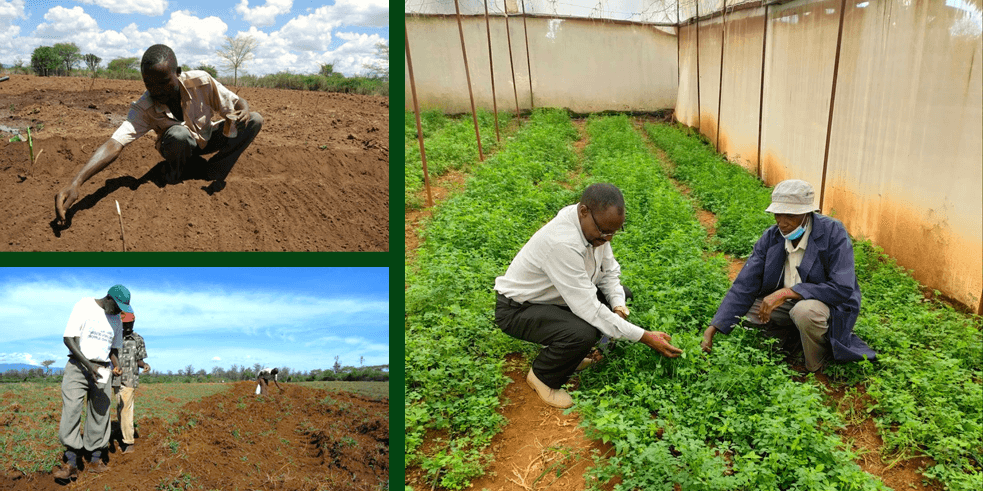
We regularly perform seed trials to evaluate which crop varieties grow best in our area and which are likely to fail. We assess cost, hardiness, weed/pest control and overall yield so that we can advise local farmers on the most successful ones.
We also advise on the most reliable distrubutors of seeds as well as facilitating bulk purchases to avail of discounts. When possible we distribute runners / seedlings from our own crops to interested members of the community.
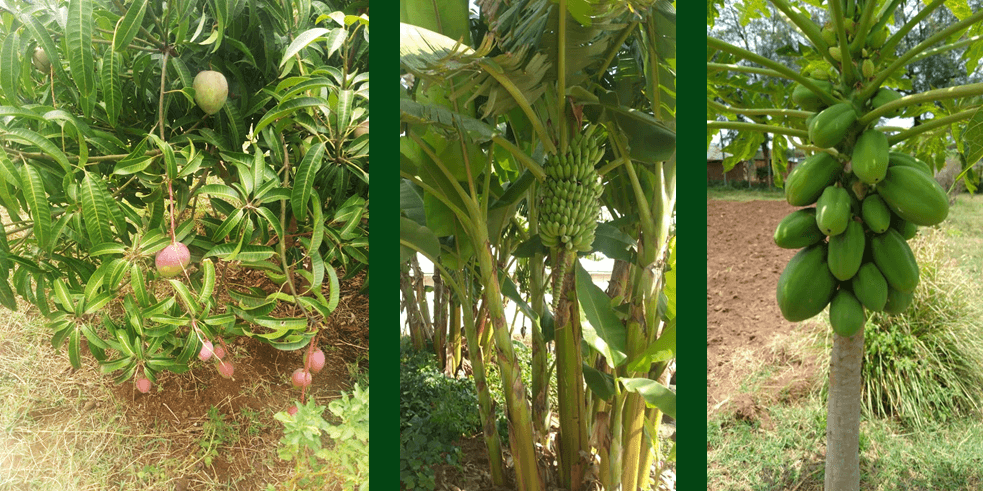
Fruit trees are not commonly grown in the area, but when mature enough to produce fruit, they are low maintenance and can become an additional source of income and nutrition for local families.
We trial various fruit trees on our farm (mango, banana, pawpaw, avocado, lemon, etc) and advise locals on the most productive ones and where to purchase them. We also provide training on how to properly maintain the trees. We have a nursery of pawpaw seedlings which we regularly distribute, along with suckers from our banana trees.
Fruit trees also act as an effective barrier around farms and are essential in the fight against deforestation (a huge problem in Kenya).
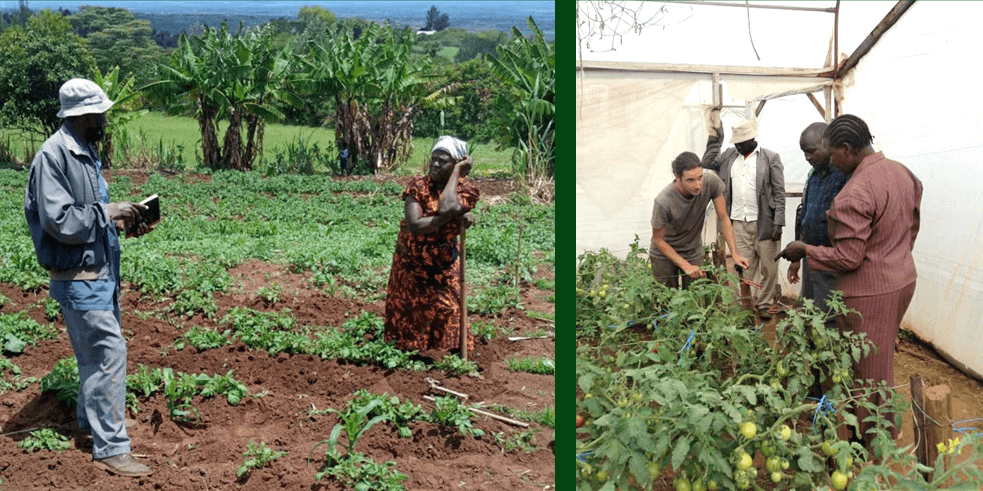
Throughout our showcasing of new farming techniques and technologies, we continue to emphasise the importance of good crop and soil management (e.g. sowing technique, weeding, pesticide/herbicide usage, soil maintenance, protection from livestock, etc.)
We use the fertiliser generated on our farm to show people how they can use compost and cow dung to fertilise their crops.
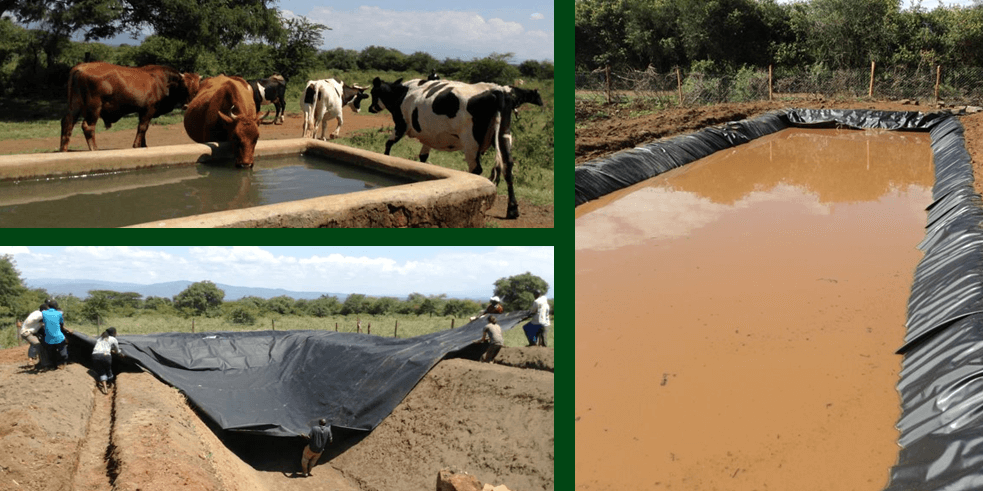
Access to clean water is a huge problem in the areas we work. The local rivers are far away, they often run dry and the water is contaminated, thus giving rise to health problems for both livestock and people.
Since the groundwater in the area is salty, the only solution to this problem is rainwater harvesting which can be done using tanks (for human consumption) and ponds (for livestock and crops). Our farm uses large ponds to collect rainwater and surface run-off; this water is suitable for irrigation and livestock.
We train local farmers and community groups in the construction and maintenance of such ponds. When someone wants to build a pond we help with funding (via partial subsidies and banking schemes), planning, installation and upkeep.
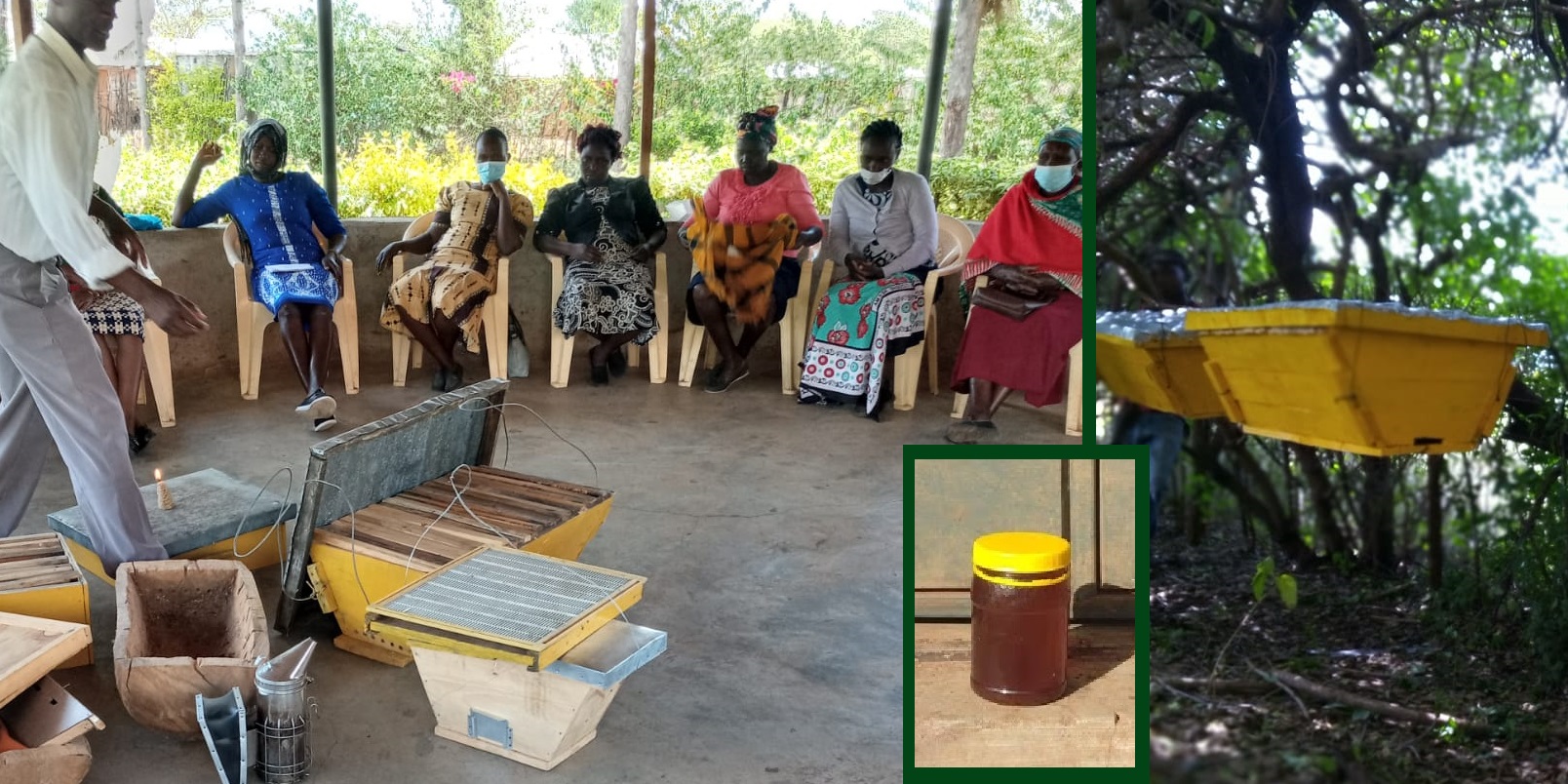
Baringo county is known all over Kenya for its high quality honey (attributed to the acacia tree). Our farm is on the border Nakuru and Baringo counties, so we hope that bee-keeping could become a viable income source for local families; it is relatively cheap (€35 for a hive) and requires little work.
Through our on-farm trials we are learning the best materials & methods to use and we hold training sessions with the community to teach locals how to do it for themselves. We also distribute beehives to the farmers who complete our training program and work with them as they being their bee-keeping journey.
We will soon begin a partnership with a local college to identify ways to improve honey production and we hope to eventually encorporate the sale of local honey into our farmer's co-op.
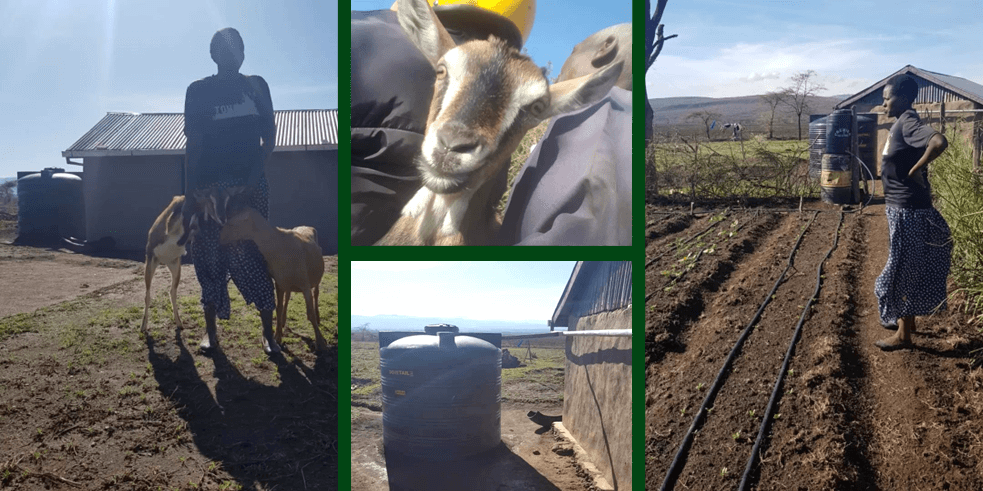
Farming in a harsh unpredictable climate is a risky business. where farmers can lose everything due to circumstances beyond their control. Diversifying into multiple areas of farming is key to help to mitigate the impact of losses.
We have recently started a diversification program for local farming families where each will be provided with the following:
Appropriate training will be provided and each family will repay a portion of the costs over a number of years, as well as providing the first-born female goat to another family. For this program we are focusing on female-led families.

We hold regular training & demonstration sessions where we invite local farmers to come and learn about the new crops and farming techniques we are using on our farm, as well as basic instruction on good farm management practices.
Where possible, our training sessions are hosted by experts in the specific topic (e.g. drip irrigation, bee-keeping, silage making, etc.) to ensure that everyone is getting the best information from the most relevant sources.
Training sessions are held either in local villages or on our farms - either out in the open, in our covered pavilion in Sarambei or in our training rooms in Rongai.
Since 2019 we have taken part in a large collaborative project entitled Climate Smart Research and Innovation for Livestock Development in Kenya with a focus on Dairying and its aim aligns closely with our own dairy program: to increase milk production & profitability by developing a breeding program & improved fodder-based diet and ensuring a spread of knowledge throughout the farming community.
The project is funded primarily (46%*) by the Irish Embassy Kenya in partnership with Teagasc, KALRO and Greenfield International. We also receive significant funding from DairyMis Discussion Group, Co Cork (30%*) and fund the remainder (24%*) ourselves. Oversight for the project is provided by Self Help Africa in Kenya.
As part of this program, our farm is being used as a Training Facility and as a Demonstration Farm.
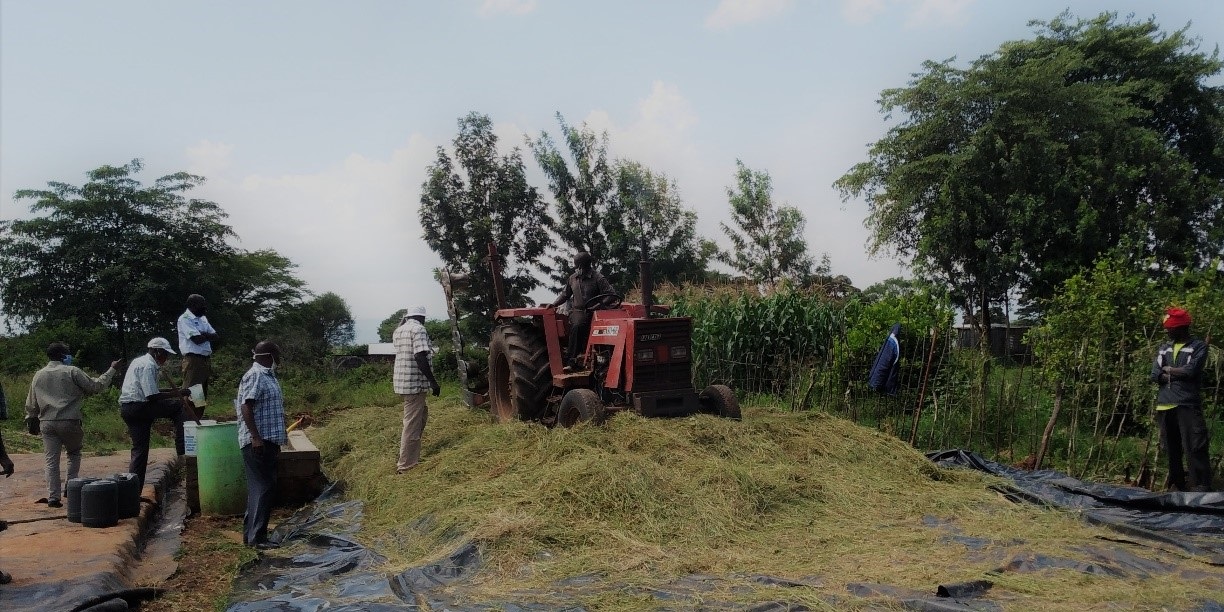
A full-time farming expert acts as advisor (extension officer) and provides training, support and oversight over 140 local farmers (from 9 villages) who trial various initiatives on their own small farms. The farmers are formed into discussion groups to share their experiences and work through any difficulties.
In 2022, 90 different training events/forums were held, reaching 178 farmers and there were 244 visits to individual farms where various techniques/issues were discussed.
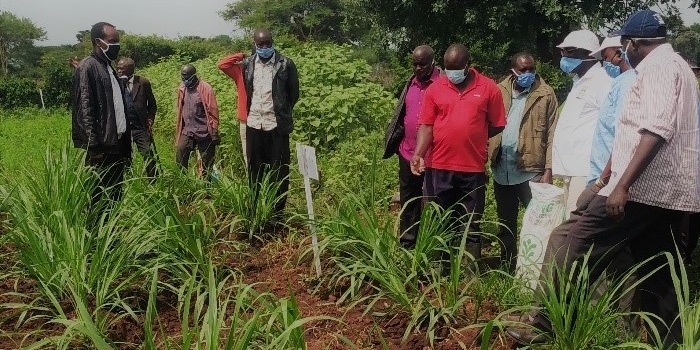
Our farm is used to showcase best practices and trial new initiatives in the following areas:
Since the onset of the program, we have seen an increase in milk production of 70% which is huge; results like these stand for themselves and are a huge reason why a demonstration farm is so essential in convincing local farmers to move away from traditional farming methods.

Our inclusion in this project has allowed us to not only expand into new areas, but also to improve our existing farm infrastructure:
We hope to eventually expand this program to form a co-operative society and credit union among the farmers we work with.
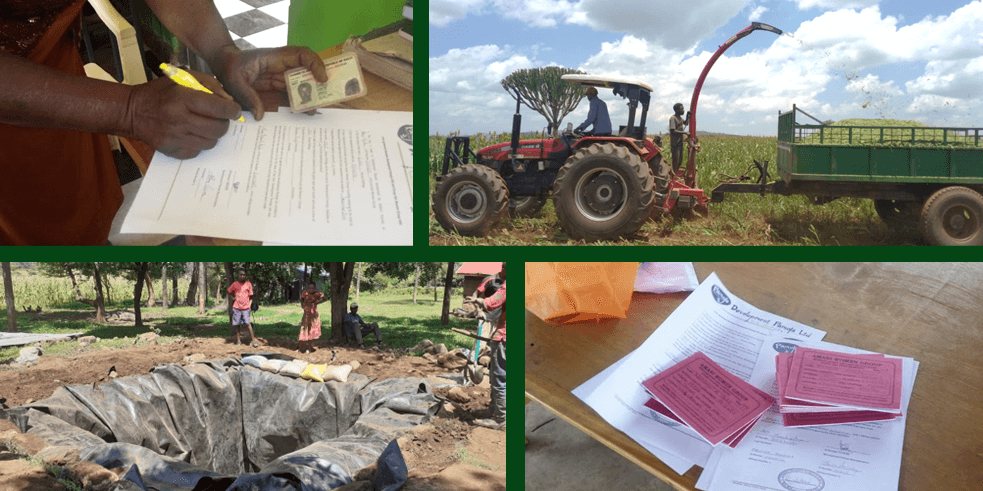
In order for farmers to implement the recommended changes to farming methods, they first need to be supported in a number of areas. It is through these crucial supports that Development Pamoja ensures that this project moves from concept through to reality.
Credit - access to credit is not readily available in rural Kenya - particularly to women. We established new table banking groups for these farmers to allow them to fully participate in this farming program.
Water - farming improvements can only be done if farmers have access to a clean water supply; we encourage all farmers in this program to participate in our water harvesting schemes - via ponds & tanks.
Machinery & Supplies - Farmers in this program can make use of our farm machinery at a subsidised price and we assist with the upfront costs of silage-making, which are paid back gradually.
Seed Purchase - we help farmers to purchase seeds which are often not readily available.
We would like to sincerely thank Teagasc and DairyMis in Ireland and the Irish Embassy, KALRO and Self Help Africa in Kenya. We would also like to thank Seamus Crosse, Tom Ryan, Owen Carton, Dermot Forristal and Brian Lenehan who have provided us with expertise in building biodigesters, forming discussion groups, designing cow sheds and recommending machinery to us.
Finally, we are extremely grateful to the anonymous donor who has completely changed the course of this project by funding the purchase of machinery - some of which has never been seen in the area.
Our farm is fulfilling its goal - the methods we showcase and teach are proving to farmers that there are better ways to farm.
Our programs & supports have allowed local farmers to adopt these more productive & efficient farming techniques and their livelihoods are more secure as a result. This is contributing to our overall aim of helping people to achieve financial security.
Our farm is also benefiting the local community in other ways:
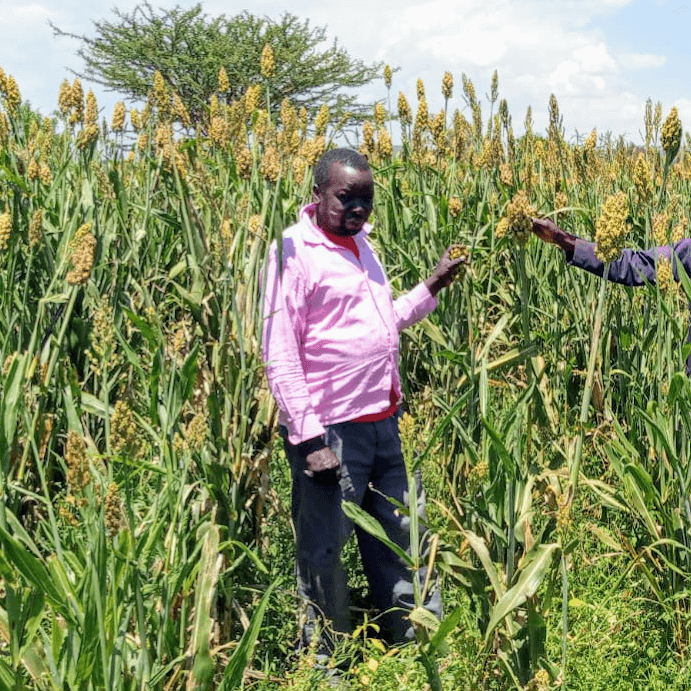
Farmer, 6 children
James lives 5km from our farm. During the dry season his wife and children used to walk the cows for miles to forage for food.
We sourced sorghum seeds for him, showed him how to plant it and used our machinery to help him to cut and make silage. With food now preserved for the dry season he won't have to worry about the well-being of his cattle and his children will be able to attend school.
.jpg)
.jpg)
.jpg)
.jpg)
.jpg)
.jpg)
.jpg)
.jpg)
.jpg)
.jpg)
.jpg)
.jpg)
.jpg)
.jpg)
.jpg)
.jpg)
.jpg)
.jpg)
.jpg)
.jpg)
.jpg)
.jpg)
.jpg)
.jpg)
.jpg)
.jpg)
.jpg)
.jpg)
.jpg)
.jpg)
.jpg)
.jpg)
.jpg)
.jpg)
.jpg)
.jpg)
.jpg)